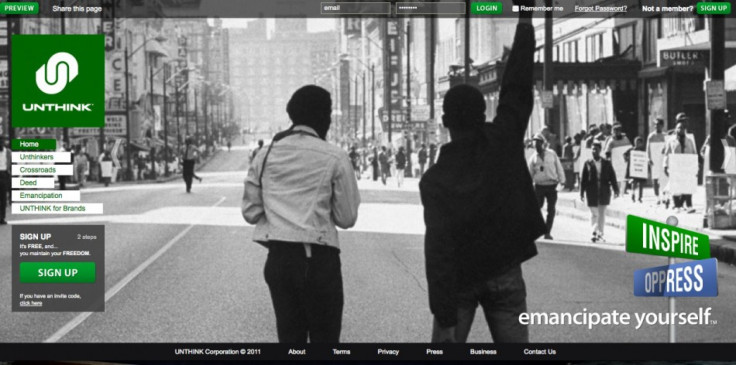Anti-Facebook Social Network Unthink Launches

Tampa-based, anti-Facebook startup Unthink launched Tuesday in a flurry of green trim and black-and-white revolution-themed photography. The newest social network claims $2.5 million in funding from DouglasBay Capital and has its sights set on taking down Facebook, Google+, LinkedIn and other social networks it says are exploiting their users by selling their information to advertisers.
CEO Natasha Dedis says she was inspired to start Unthink when she read the Facebook terms of service, which she felt gave the company too much control over user data and were liable to change at any time.
The number one thing that had to be 'un-thought' about social media, is who does it belong to? said Dedis at the recent Tampa Bay Barcamp conference in Florida. We need to own everything that we put on our page. We can be as private or as public as we want, as long as it's our choice.
The theme of the site, hammered home by the use of evocative language like emancipation and destiny and Civil Rights-era photography, is the right of the individual to control his or her own information. The Unthink welcome page includes links not only to log-in and information, but also highlights their manifesto - Emancipation - and the Deed section, which outlines the user's privacy rights and agreement with Unthink:
We at UNTHINK grant the UNTHINK Deed to all our Suite and Stage settlers in the spirit of returning control to the people. The UNTHINK Deed defines the rights emancipated people and brands must have, fundamental among these being ownership, privacy, quiet enjoyment, and security from unilateral term changes. It evidences that these rights must be present at once for people and brands to be emancipated and in control of their destiny.
Once inside, the user is greeted with their profile, or 'suite.' The service lends itself well to selective sharing, dividing posting streams into four categories: Public, Social, Lifestyle, and Professional. The Public stream is viewable by anyone, while the Social stream shares only with friends and Professional only with colleagues, recruiters and employers.
A central difference between Unthink and Facebook lies in the interaction between the user and the brands using the network. Users connect with businesses in the Lifestyle stream, choosing brands to be their sponsors. Users may also determine what type of messages they want to receive from those companies and how often. If users opt out of interacting with brands completely, they may pay an annual fee of $2.
While Unthink appears to be sincere in its wishes to help social network users maintain control over their content, the question that remains to be answered is whether users are likely to sacrifice the simplicity of one-stop social networks like Facebook in favor of the privacy controls Unthink offers.
© Copyright IBTimes 2024. All rights reserved.




















